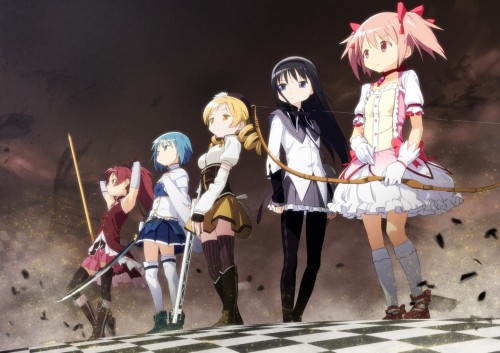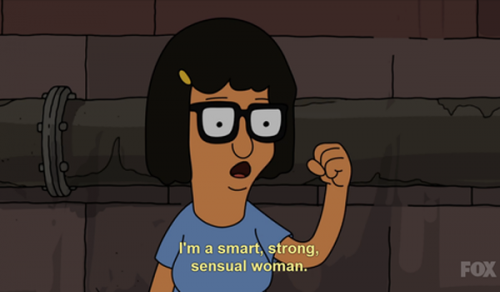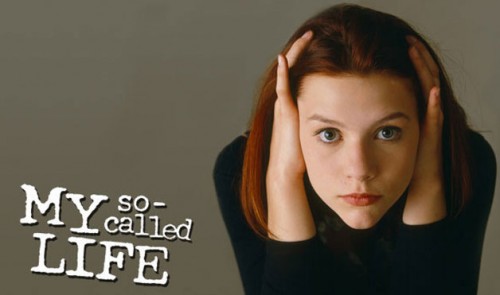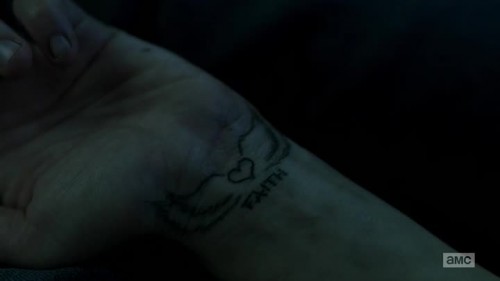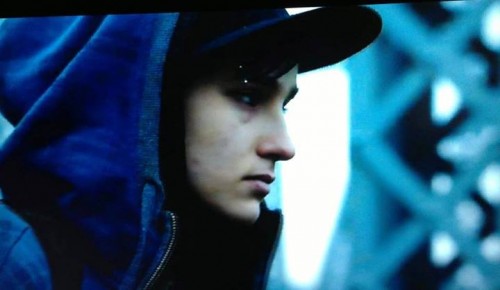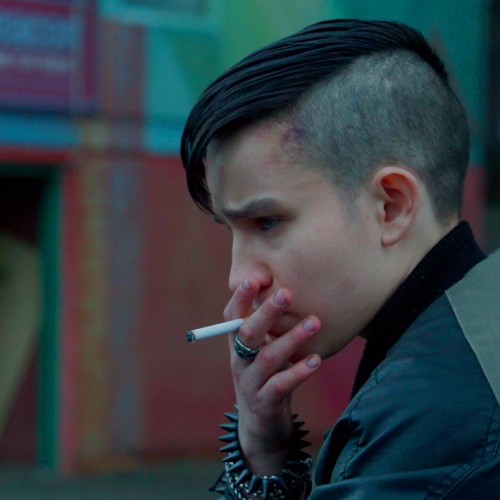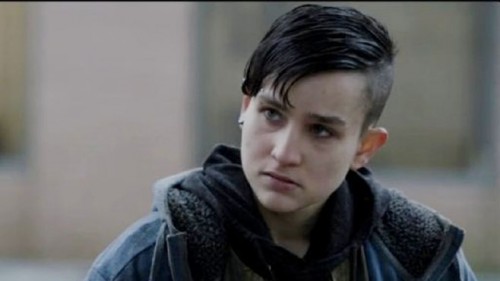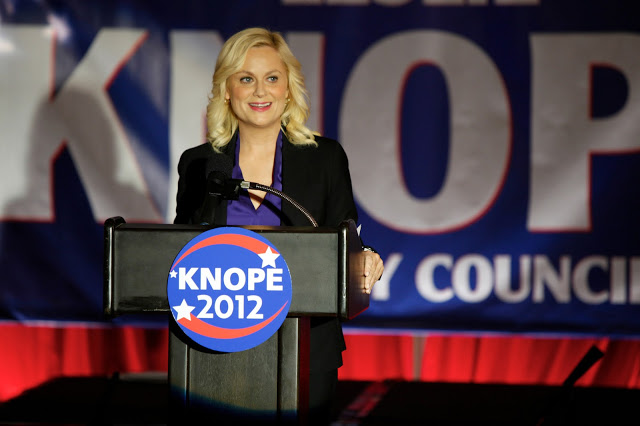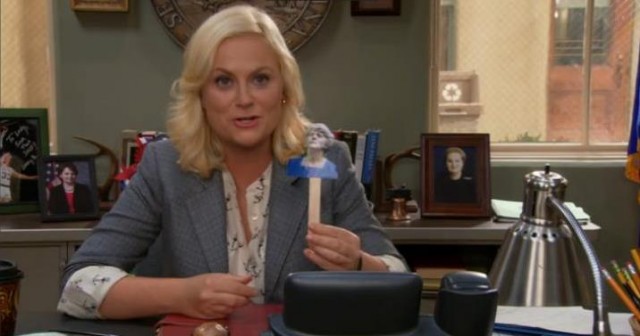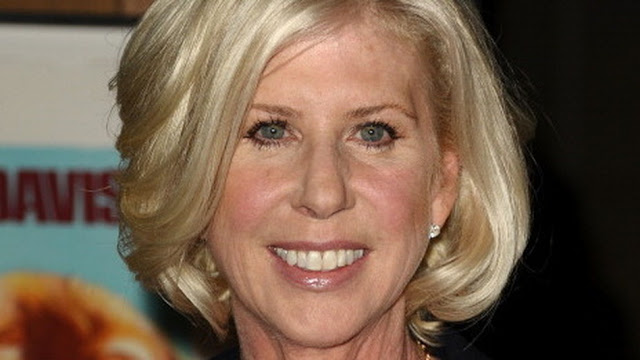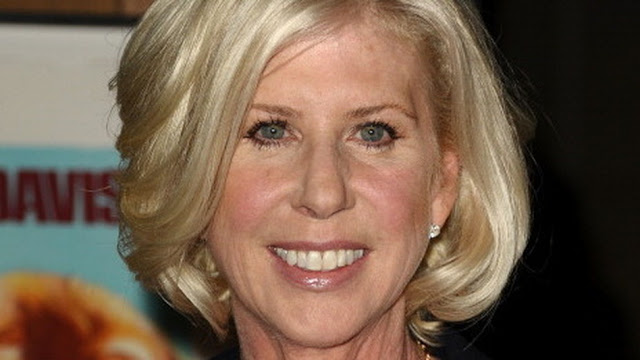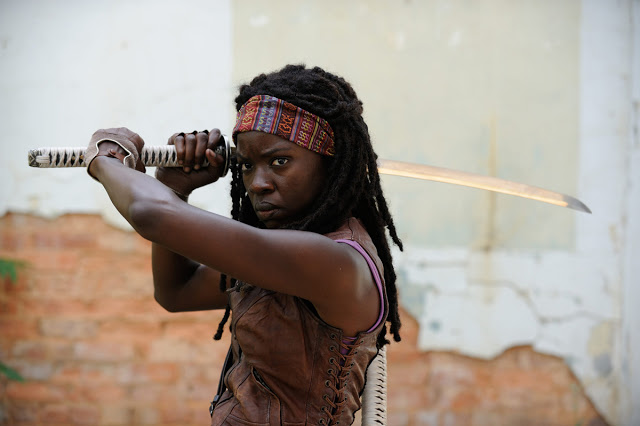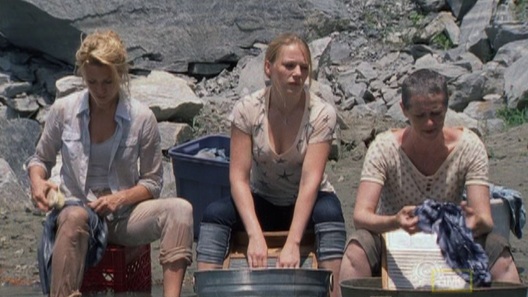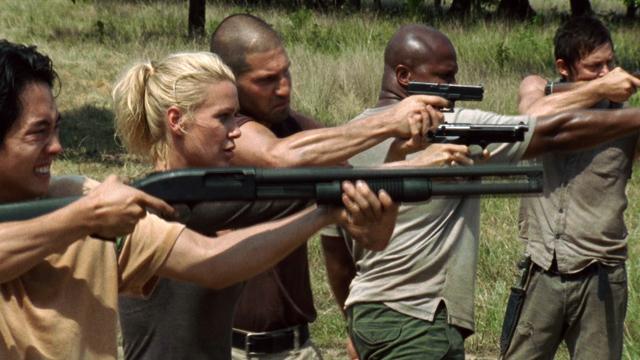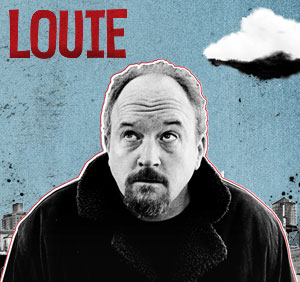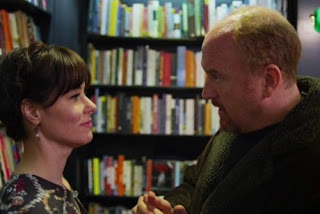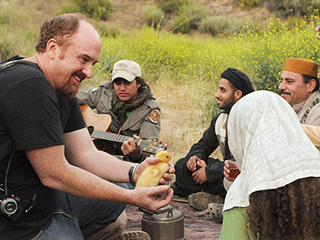
Sayaka Miki, Mami Tomoe, Homura Akemi, and Madoka Kaname.
This guest post by Matthew Abely appears as part of our theme week on Child and Teenage Girl Protagonists.
It has been said over and over again that “Religion is the opiate of the masses;”[i] that is just not fair. It is not the masses, it is the privileged and powerful, and it is not just religion that is their opiate, it is anything that provides a perpetual escape from the reality that with power and privilege comes responsibility. Today a lot of people use anime for this. Beloved anime like Studio Shaft’s spring 2011 series, Puella Magi Madoka Magica (Madoka Magica for short), among others, are heavily feminist. Go online and even suggest something remotely like this, however, and a virulent few will inevitably rise to shut such thoughts down.[ii] Not this time.
Madoka Magica has a sequel film premiering in theaters,[iii] and it is high time the series’ social criticism and advocacy were recognized. It is high time many an anime received such praise. Madoka Magica, however, is the right place to start. Why is rape and violence against women such a common cross-cultural occurrence that such a term as “rape culture” exists?[iv] Why is male supremacy likewise just as common that there is a term called “patriarchy”?[v] Why does patriarchy inevitably stratify along class, race, and related social lines (this is called “kyriarchy”)?[vi] Why would anyone institutionalize evil like this?
Madoka Magica is not a perfect response. It does answer all of the above; however, it is in its subtext only. The merchandise its creators license also objectifies the teenage cast horribly.[vii] The series, however, is still a good place to start. It may only answer these aforementioned fundamental questions of feminist theory through symbolism and allegory. It however also does something few others works of popular fiction seem to do. It gives an idea of what to do about its answers.

Madoka Kaname sees herself as nothing more than average and plain.[viii]
Until the day an entity named Kyuubey informs her that she has dormant superpowers. Magic is real, and everywhere there are invisible monsters called witches instigating traffic accidents, suicides, natural disasters, and more. Kyuubey explains that he and his species, the Incubators, search endlessly for people with dormant magic in order to offer them a contract. He will grant a person any one wish, and in return they must let him awaken their magic and pledge to do battle with witches as magical girls. Madoka finds out, however, that Kyuubey is not telling the whole truth.[ix]
He awakens magic by placing a person’s soul in a gem, thus making each magical girl the undead. Magical girls’ powers have limits. Should they exhaust all the magic of their soul gem, they die. Witches are born whenever a magical girl dies from soul gem exhaustion. Magical girls themselves can also transmogrify into witches should they succumb to madness, despair, or choose evil. The birth of a witch releases a lot of energy; the transmogrification of a magical girl even more. The Incubators use this energy to fuel the multitude of civilizations across the Earth and universe that they rule from behind the scenes. They do not, however, use everyone as a battery. The Incubators indirectly institutionalize it so that only pubescent girls must be sacrificed.[x]
It is the most efficient way; it is all for the greater good, Kyuubey claims.[xi]

He is not the only one who does. In the United States and Canada, a man rapes a woman every minute; another man hits a woman every nine seconds; men murder 1,000 women via domestic violence a year.[xii] The law prosecutes less than 10 percent of these men, convicting and sentencing even fewer.[xiii] Who cares? Steubenville and Pennsylvania State have football games to win.[xiv] Roman Polanski has too many great films to make and Julian Assange too many great secrets to reveal.[xv] Society simply cannot afford to have any of these rapists waste away in prison. People kill or sexually enslave at least 200 million women in and around China and India since the One Child Policy began.[xvi] No matter, class warfare—the population boom—must be stopped.[xvii] Besides, if Senator Hilary Clinton became president of the United States of America[xviii] or Doctor Wangari Maathai a member of the Kenyan Parliament[xix], their “PMS and mood swings” would destroy progress.
It is all for the greater good. It is building a better, immortal, world, Kyuubey repeats over and over again.[xx] In this better world, however,all four of Madoka’s friends die more horribly than the last.[xxi]

Mami Tomoe, weighed down by the guilt of her parents’ death, attempts to atone by being the perfect school girl, perfect host, perfect warrior, perfect mentor, and perfect leader. She stretches herself too thin; a witch gores her to death.[xxii] Sayaka Miki, upon finding out that her contract made her a zombie, thinks herself too tainted to deserve the love of her secret crush, especially when it turns out he already loves, and is loved in return, by a much more conventionally feminine girl than she. Sayaka resolves to repress all her passion and desire. She transmogrifies into a witch.[xxiii] Kyoko Sakura uses her magic to help her preacher father convert people to his new strand of Christianity. Ashamed to have needed magic’s help, he murders Kyoko’s sister and mother, and attempts to kill Kyoko as if they were property, before hanging himself. Kyoko becomes so belligerent and cynical that her attempt to befriend Sayaka Miki, whom Kyoko finds she may actually love, backfires. Kyoko commits suicide, battling the witch she helps push Sayaka into becoming.[xxiv]
Homura Akemi comes to love Madoka Kaname. The first time they meet, Madoka is a magical girl. Madoka dies in battle. Homura wishes for the power to change this. She travels back in time, over and over again, trying to save Madoka by any means necessary, including murder. No matter whom she kills, however, Homura makes Madoka’s fate worse with each loop. Madoka dies in battle. Madoka dies and give birth to a witch. Madoka dies and gives birth to a witch that destroys the earth.[xxv]
The Incubator’s desire for immortality and demands for perfect maximum efficiency affects more than just children’s attempts to find happiness. Only the relationship between Madoka’s parents is based on collaboration and equality.[xxvi] Every other adult relationship shown is based on competition and hegemony. Madoka’s teacher is constantly dumped for being an imperfect wife.[xxvii] Madoka’s mother Junko must constantly prove her worth as a business executive by drinking hard with the big boys.[xxviii] Their neighbors and community forced Kyoko’s family into starvation and destitution when her father’s preaching diverted from Christian dogma.[xxix] Sayaka breaks and transmogrifies when she encounters two men on a train waxing loudly about the importance of physical and emotional abuse.[xxx]

There are beautiful walkways, malls, cafes, schools, apartment complexes in this better world the Incubators have built,[xxxi] yet there are few if any signs that there is community. The streets are usually deserted.[xxxii] The cafes full of empty chairs at empty tables.[xxxiii]

Pedestrians do not interact.[xxxiv]

Only Madoka notices it when a witch’s curse induces a mass hypnosis in the middle of a street.[xxxv] Sayaka and Kyoko have two loud battles, one that breaks a water pipe and one on a bridge over a crowded freeway.[xxxvi] Nobody notices them. When they die, no one realizes that Mami and Sayaka are even missing until days later.[xxxvii] No one ever noticed that Kyoko still existed after her father’s suicide.[xxxviii] Three characters (Mami, Homura, and Sayaka’s crush Kyouske) all suffer from traffic accidents. No one explains them, and likewise few people notice how common suicides, accidents, natural disasters, and general strife seem to have become.[xxxix]

This better world the Incubators have built may be immortal, yet there is no reason to live in it. There is no companionship nor trust nor love. Madoka sees this; Kyuubey however, continues to insist that short of returning to being naked in caves, there is no other way to live.[xl] He, again, is not the only one. Even in the face of impending environmental catastrophe, President George H. W. Bush stated: “THE American way of life is not up for negotiation.” [xli] This same American Life has made its people less and less happy since the 1950s, while the amount of time they work has more than doubled.[xlii] “Let some people get rich first,”[xliii] Chinese Vice-Chairman Deng Xiaoping declared this to be the way to build a modern China. No one suffers from as much smog as the Chinese.[xliv] Still, men like this and Kyuubey continue to insist: it is foolish to think that there is another way live well. Madoka comes to disagree.
Madoka wishes for the power to stop all witches throughout space and time from being born, and save all magical girls from transmogrifying into them. It works. Madoka ascends to godhood and recreates the universe into one where Kyuubey cannot transmogrify anyone into a witch.[xlv]


Though she sacrifices her own mortal existence and all memory that she ever existed in every mind, except Homura’s,[xlvi] she opens a door. Kyriarhcy and its ilk seem to continue to exist in the new universe that Madoka creates.[xlvii] Homura and the now reborn Mami, Kyoko, and Sayaka, however, now have the freedom and so the responsibility to fight back. The same has been true the viewers this whole time.
Madoka Kaname is not the only one who found another way. Those people so often scored as too effeminate to lead: like Wangari Maathai, Hilary Clinton, and more–they often have as well. Doctor Maathai and the Green Belt Movement toppled a 30-year dictatorship in Kenya. Their first move: empowering communities of impoverished women to plant trees.[xlviii] They did not win it alone.[xlix] Those who have the privilege to experience art and anime, can choose to use them like drugs, and attempt to escape from reality. We can all stay individuals relating primarily by competition, pretending this will stave off environmental collapse,[l] or we could choose to become communities, and continue to prove to everyone, human or otherwise, that there are always other ways to live well than violent sacrifice.
Immortality is not what makes a world better. Hope, friendship, and love do, and love is not limited by sex, gender, ethnicity, or race. Women like Homura and Kyoko can fall in love with other women like Madoka and Sayaka respectively.[li] We have the responsibility to stand up with people like them. This series is part of the reason I try to do that and more. I hope that many others to do the same.

Matthew Abely is a recent college graduate, longtime nerd, and novice ally to intersectional feminists. When not researching, writing, or working, he can be found attending comic book conventions with friends on the United States’ Pacific Northwest and Central Coast, or exercising.
[v] Ibid.
[vi] Ibid.
[vii] Puella Magi Madoka Magica Silk Printing, Mahou Shoujo Madoka Magica Anime Fabric Wall Scroll Poster
[viii] Puella Magi Madoka Magica. Akiyuki Shinbo. Aniplex: Studio Shaft, 2011. Film, Episode 10.
[xi] Ibid.
[xiii] Ibid.
[xiv] Ibid.
[xvii] Ibid.
[xxi] Ibid.
[xxii] Ibid, 1-3.
[xxiii] Ibid, 4-8.
[xxv] Ibid, Episode 10.
[xxvi] Ibid, 1-12.
[xxvii] Ibid, 1.
[xxviii] Ibid, 1-6.
[xxix] Ibid, 8.
[xxx] Ibid, 8.
[xxxii] Ibid.
[xxxiv] Ibid, 5.
[xxxv] Ibid, 4.
[xxxvi] Ibid, 6-7.
[xxxvii] Ibid, 11.
[xxxviii] Ibid, 5-9.
[xl] Ibid, 11.
[xliii] Deng, Xiaoping. Speech.
[xlvi] Ibid.
[xlvii] Ibid.
[xlix] Ibid.
